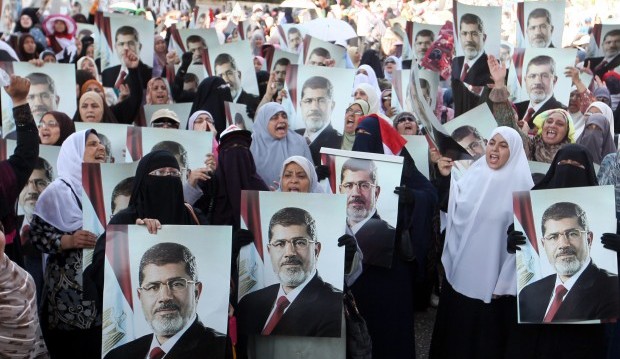Following the collapse of any regime in the Middle East, it is inevitable for secrets to come out, and for documents that condemn the previous government to be leaked. This even happens with regime that had been semi-open and transparent in their dealings, as was the case with the monarchies in Iraq and Egypt, and republics in Lebanon and Yemen. In this case, what can be said about the explicitly secret and opaque regimes?
In the West, where true democracies exist, such documents can be published with limited restrictions. However in the Middle East, documents such as this are like unearthed treasure. Here we are talking about regimes that came to power through coup or revolution, not regimes that are largely a continuation of ruling systems already in place. In Egypt, the Muslim Brotherhood are still in a state of shock over their ouster, however this shock is spreading to the general populace as secrets of their one year in power come to the fore.
Egypt’s Al-Ahram newspaper, for example, claims to be in possession of official documents that condemn senior Brotherhood figures, including deposed president Mohamed Mursi himself. In summary, these documents reportedly expose a conspiracy against public safety and stability, in addition to US-Brotherhood collusion. Al-Ahram claims to be in touch with former regime officials and senior sources who are prepared to leak documents and even audio recordings that will shock the country.
One might argue that such a state of affairs is only natural, that it is part and parcel of politics to kick a man when he’s down, and that history is written by the victor. However at a time of satellite television and the ease of making audio and even video recordings, the leaking of official documents serves an important purpose. Such documents are not the testimony or views of the opposition, but are clear and explicit documentation issued by the former regime itself. In this case, the former regime would be condemning itself and in its own words, if these documents ever come to light. In any case, Al-Ahram has yet to publish any of these documents, claiming that it will do so in the near future.
For myself, I recently watched a video recording of deposed President Mohamed Mursi sitting next to Muslim Brotherhood General Guide Mohamed Badie in the presence of other Brotherhood leaders. In this recording, Mursi summarized his contacts with American government and non-government actors. He said that the Americans had championed the Brotherhood’s rise to power and that they were keen to ascertain the group’s attitude towards peace with Israel. Following this, Mursi quoted a US official as saying that the Americans would secure approval of a loan for Egypt from the World Bank and even assistance from the Gulf States if the Egyptians agreed to play ball with them. The deposed president then winked knowingly and told his audience: “He (the US official) wanted to say that the Gulf and the World Bank were in his pocket, and all that we have to do is help them.” Following this, those attending this meeting could be heard laughing and murmuring.
It was clear that this recording was made when the Brotherhood were at the height of ecstasy regarding their rise to power. It is also noticeable here that the Brotherhood’s political views at this time were somewhat shallow and immersed in naive conspiratorial imaginations.
The Gulf States attitude towards Egypt is governed by the calculations of the Gulf States themselves, not the US, especially under the current administration. The fact of the matter is that the relevant Gulf States in this instance—Saudi Arabia, and the UAE—were not subject to US desires or pressures; neither in Syria, nor in Egypt. The Gulf States’ position towards Egypt is one of supporting the “state” of Egypt, not any particularly group or organization within it. This is no secret, and everyone was able to see this except Badie and his brothers.

Sorry fo Egyptian people.
July 3rd 2013 its sad day for democracy in Egypt, the military coup first democratically elected president Dr. Mohammad Morsi, change the country direction from peace to disaster so far over 250 innocent people have been killed mostly Morsi supporter.